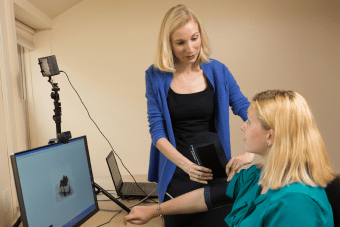Not only is the mystery of the brain itself still an enigma on a universal scale, but the very nature of psychiatric diagnoses relies heavily on subjective, patient-to-doctor reporting that is prone to all the whims of human nature.
So when it comes time to study and treat mental disorders, scientific accuracy is not always a given.
Dr. Javaras, an assistant psychologist at McLean Hospital, an assistant professor at Harvard Medical School and the recipient of Rappaport Mental Health Research Scholar Awards in 2015-16 and 2016-17, has been trying to bridge that gap. Because, as she succinctly says, “If you can’t measure it, you can’t study it.”
She brought a mind built to, and bent on, improving psychiatric measurability when she arrived at McLean in 2015. Her resume was impressive – a BA in Statistics from Harvard, a Rhodes Scholar and Doctor of Philosophy in Statistics from Oxford, and a Ph.D. in Clinical Psychology from the University of Wisconsin at Madison – but perhaps more importantly, she came with a first-hand understanding of the devastating effects of mental illness.
As a young ice skater, she had helplessly watched a teenage friend who developed anorexia nervosa (“the most inept I’ve ever felt in terms of how to help someone”), and later she witnessed the impact of severe mental illness on a graduate school colleague.
At McLean, her research and clinical practice would be to specialize in eating disorders and other eating-related challenges, and she understood that to best help those like her young friend so many years before, and others, she would need to first get the best information possible.





